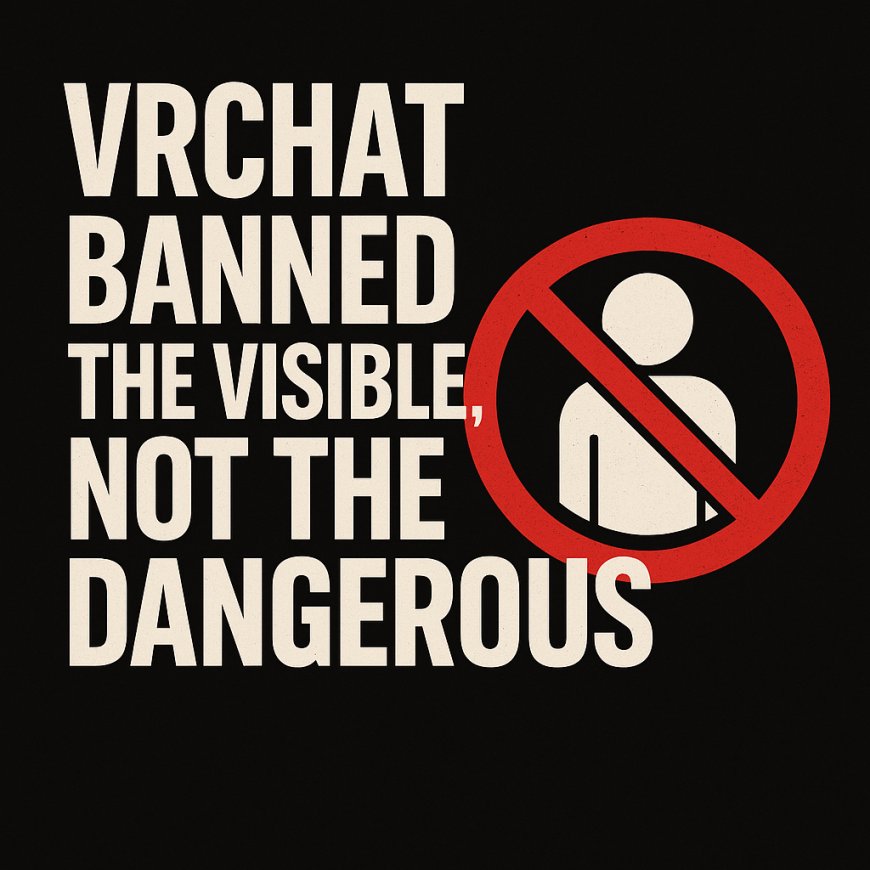VRChat Banned the Visible, Not the Dangerous
VRChat’s response to BBC’s grooming exposé didn’t protect minors—it erased trauma survivors. This article exposes the crackdown on “littles,” a misunderstood neurodivergent group, while real predators remain untouched.

When the BBC released their now-infamous sting piece on VRChat, their goal wasn’t safety. It was spectacle. They posed as minors. They walked into open lobbies. They recorded without consent. And they left without helping anyone.
What came next wasn’t accountability. It was deflection. VRChat didn’t reinforce moderation. They didn’t fix reporting. They didn’t address grooming. They rewrote the Terms of Service and launched a quiet crackdown. But not on predators.
They went after littles.
Who Littles Actually Are
Littles are not children. They’re not acting out fantasies. They’re not here to bait anyone. Littles are adults, often trauma survivors, who express themselves through regression. It’s a coping mechanism. A neurodivergent space. A trauma-safe framework.
For many, it’s tied to PTSD, C-PTSD, or DID. It’s not sexual. It’s not public. Most littles exist inside locked, friends-only instances. They don’t advertise. They don’t push their presence on others. They exist quietly and authentically, using VRChat as a therapeutic outlet.
What VRChat Actually Did
In the wake of the BBC’s story, VRChat didn’t clean up its public spaces. It didn’t roll out better grooming protections. It didn’t review its trust system. Instead, it pushed through vague policy language aimed at “childlike behavior.”
They targeted regression speech. Pacifiers. Plushies. Diaper avatars. People who expressed softness, vulnerability, and non-confrontational energy. The message was clear: “If you look small, you're a threat.”
No distinction was made between kink and coping. No effort was made to ask, consult, or understand. Littles were silenced because they were easy to find.
What the BBC Got Wrong
The BBC didn’t expose pedophiles. They exposed surface-level access and packaged it for outrage. They filmed users, edited for shock, and never reported the behavior to the authorities. Their piece was for views, not protection.
It left real predators untouched. It weaponized misinformation against an entire community of adults who never harmed anyone. It forced VRChat into a PR panic.
And instead of standing up for nuance or truth, VRChat erased the people least responsible.
And Now?
Littles are in hiding. The safe private worlds they used for healing are now under watch. Many accounts have been mass-reported, flagged, or banned not for abuse, but for existing outside a sanitized model of expression.
Meanwhile, the predators? Still here. New usernames. New friend groups. New hiding spots. Same behavior.
The people who needed protecting the most, minors and survivors, got nothing.
The Real Danger
VRChat didn’t clean its platform. It cleaned its optics. And by doing that, it sent a message:
If you're open about who you are, you’re a threat. If you hide it, you're safe.
That’s not safety. That’s camouflage for abusers.
Conclusion
I’m not writing this because I’m afraid. I’m writing it because I have nothing to lose by speaking the truth. I still play VRChat. I still see what happens in the lobbies, behind the muted walls, and inside the friends-only circles.
What happened to littles wasn’t protection. It was erasure. What happened to moderation wasn’t improvement. It was avoidance.
And what happened to VRChat’s promises? It’s simple.
They banned the visible. Not the dangerous.
Sources
What's Your Reaction?
 Like
0
Like
0
 Dislike
0
Dislike
0
 Love
0
Love
0
 Funny
0
Funny
0
 Angry
0
Angry
0
 Sad
0
Sad
0
 Wow
0
Wow
0


















